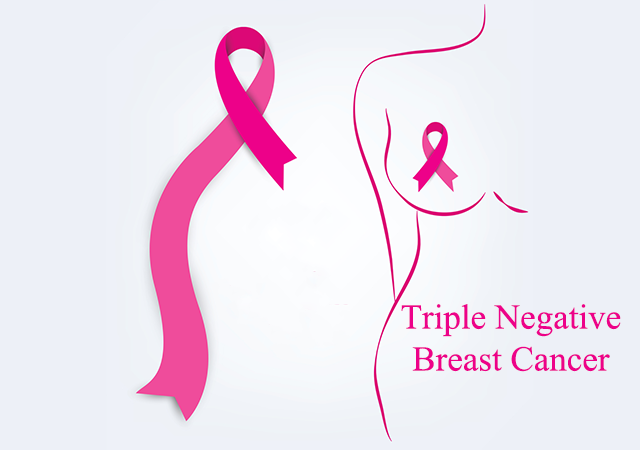Triple-negative breast cancer or TNBC is a type of breast cancer that does not have any of the receptors that are typically found in breast cancer. As aggressive cancer, TNBC grows and progresses quickly. It’s more likely than other breast cancers to come back. TNBC has limited treatment options, which tends to make for a poorer prognosis. This can be treated with surgery, chemo, radiation therapy, immunotherapy and newer breast cancer treatment options through clinical trials.
About Triple-negative Breast Cancer (TNBC):
Estimated 10 % to 15 % of all breast cancers are triple-negative. Its name signifies that cancer cells have tested negative for 3 molecular components of breast cancer cells; receptors for the hormones estrogen and progesterone, and the protein known as a human epidermal growth factor, or HER2. Triple-negative breast cancer (TNBC) is defined as progesterone receptor-negative, estrogen receptor-negative (ER-) and, HER2-negative.
- Certain women are more likely to be diagnosed with triple-negative breast cancer (TNBC):
- Black women
- Women aged younger than 40 years
- Women with a BRCA1 gene mutation
Note: Triple-negative breast cancer (TNBC) may also be more common in Hispanic women.
Signs and Symptoms of Triple-negative Breast Cancer (TNBC):
The signs and symptoms of TNBC are the same as with all other breast cancers. The disease may present as a lump, which is hard, painless and irregular, but can also be soft, round, and painful. Other signs and symptoms include:
- Breast swelling
- Discharge from a nipple
- A nipple that turns inward
- Swelling or a lump under the arm or on the collarbone
- Dimpling of the skin, occasionally reminiscent of an orange peel
- Skin changes on the breast or nipple, including redness, dryness, thickening, or flaking
Diagnosis of Triple-negative Breast Cancer (TNBC):
Imaging tests are typically the first tests done:
Mammography: This is the most commonly used screening tool for breast cancer. It uses X-rays to capture images of the breast and can uncover tumors that may be tiny to feel.
MRI (Magnetic Resonance Imaging): This uses a magnet, radio waves and a computer to make detailed images of the breast with high resolution than a mammogram offers.
The next step is a biopsy to eliminate a sample of suspicious cells from the breast to examine them. Techniques include:
- Fine-needle aspiration biopsy
- Core needle biopsy
- Surgical biopsy
Suitable biopsy for you typically depends on factors such as the size of the tumor and its location. A biopsy of underarm lymph nodes is done at the same time to check if any cancer is there.
Triple-negative Breast Cancer (TNBC) Treatment:
For triple-negative cancers, primary types of cancer-fighting treatment are significant options. These typically include:
- Surgery
- Chemotherapy
- Radiation
Surgery may be a breast-conserving type, such as a lumpectomy, or mastectomy (removal of complete breast tissue from the breast), on behalf of the tumor’s characteristics. In both cases, surrounding lymph nodes would be eliminated and examined to check if cancer has progressed.
Chemotherapy may be given prior to surgery for shrinking the tumor or following surgery to help prevent cancer recurrence. If someone is a candidate for oral chemotherapy they may be given a drug known as capecitabine for 18-24 weeks, to destroy cancer cells. Chemotherapy for breast cancer appears to have a bit more benefit for those with triple-negative breast cancer than it does for those who have HR-positive cancer.
Radiation therapy for breast cancer involves targeting the breast with high-intensity radiation to kill any unhealthy cells that might have been skipped/missed.
The additional treatment options for the more advanced stage of breast cancer may include PARP inhibitors, advanced forms of chemotherapy, platinum-based chemotherapy medicines (carboplatin and cisplatin), and Immunotherapy.
Immunotherapy medicines known as checkpoint inhibitors can help the immune system resist or even inhibit the progression of cancerous cells. These include the monoclonal antibody medinal products pembrolizumab and atezolizumab.
- In combination with chemotherapy, medicine atezolizumab is considered a first-line treatment for a type of triple-negative breast cancer (TNBC) that makes a protein named PD-L1, found in approximately 20 % of these cancers.
- Pembrolizumab is primarily used for recurrent tumors that make PD-L1 that can’t be surgically eliminated or when cancer has progressed.
Metastatic breast cancer may also be treated with an antibody-drug conjugate (ADC)—a medicine that links a chemical toxic to unhealthy/cancerous cells with an antibody that targets a receptor that helps cancer grow. There is an FDA-approved medication named Sacituzumab govitecan-hziy (Trodelvy) for those whose triple-negative breast cancer (TNBC) has metastasized and who previously received two other cancer therapies.
Survival Rates for Triple-negative Breast Cancer:
The survival rates (SR) are averages determined by what’s happened in the past. As research and cancer treatment evolves, the outlook may enhance. The 5-year survival rate for someone with localized triple negative breast cancer (TNBC), cancer that has not progressed beyond the breast, is 91 % (91 % as likely as someone without cancer to survive during the 5-year period). For cancer that has progressed into nearby lymph nodes or nearby areas, the 5-year survival rate is 65 %. For cancer that has progressed into the bones, lungs, or liver, the survival is 11 %.
Get in Touch with us for TNBC Treatment Medicines:
Patients, physicians, and hospitals can authentically access TNBC treatment medicines from Indian Pharma Network. Make an inquiry and we will help you calculate the total price to buy Trodevy 180 mg injection online and have it delivered where you live. We`re well known in the healthcare industry for our quality service, vast industry experience, market credentials, on-time delivery, and good financial standing. Our tie-ups and sourcing from the reputed brands enable us to offer the best prices for TNBC medications.

